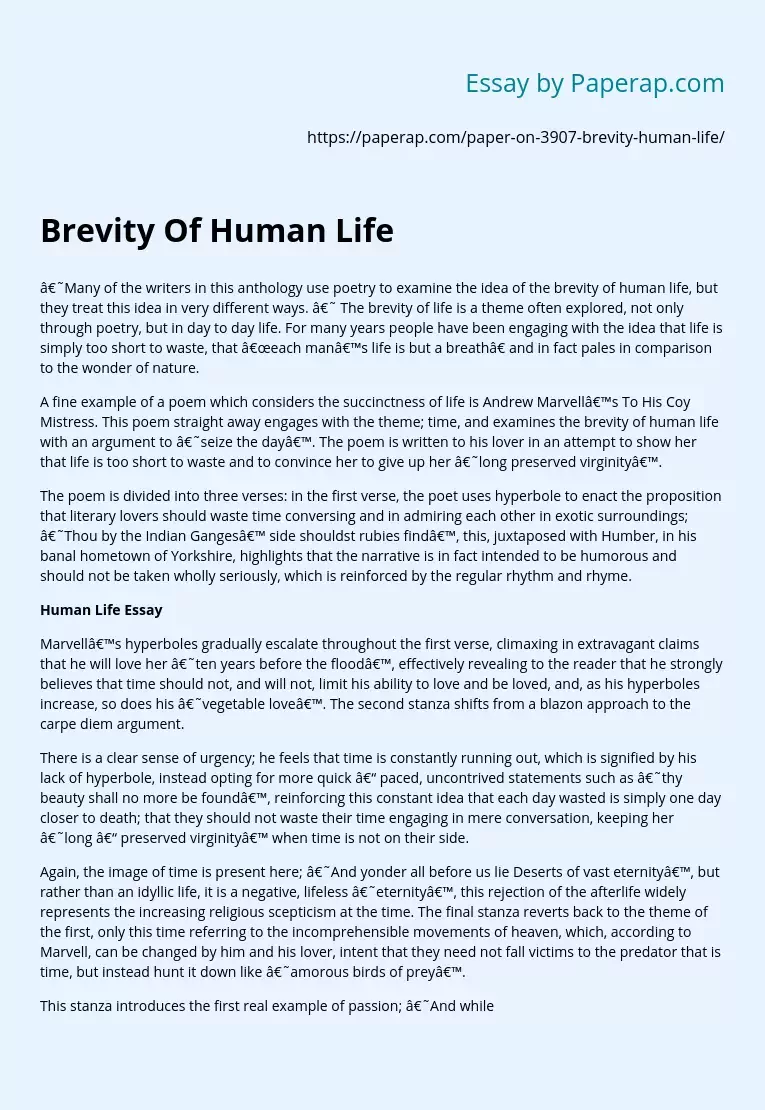Brevity Of Human Life
‘Many of the writers in this anthology use poetry to examine the idea of the brevity of human life, but they treat this idea in very different ways. ‘ The brevity of life is a theme often explored, not only through poetry, but in day to day life. For many years people have been engaging with the idea that life is simply too short to waste, that “each man’s life is but a breath” and in fact pales in comparison to the wonder of nature.
A fine example of a poem which considers the succinctness of life is Andrew Marvell’s To His Coy Mistress. This poem straight away engages with the theme; time, and examines the brevity of human life with an argument to ‘seize the day’. The poem is written to his lover in an attempt to show her that life is too short to waste and to convince her to give up her ‘long preserved virginity’.
The poem is divided into three verses: in the first verse, the poet uses hyperbole to enact the proposition that literary lovers should waste time conversing and in admiring each other in exotic surroundings; ‘Thou by the Indian Ganges’ side shouldst rubies find’, this, juxtaposed with Humber, in his banal hometown of Yorkshire, highlights that the narrative is in fact intended to be humorous and should not be taken wholly seriously, which is reinforced by the regular rhythm and rhyme.
Human Life Essay
Marvell’s hyperboles gradually escalate throughout the first verse, climaxing in extravagant claims that he will love her ‘ten years before the flood’, effectively revealing to the reader that he strongly believes that time should not, and will not, limit his ability to love and be loved, and, as his hyperboles increase, so does his ‘vegetable love’.
The second stanza shifts from a blazon approach to the carpe diem argument.
There is a clear sense of urgency; he feels that time is constantly running out, which is signified by his lack of hyperbole, instead opting for more quick – paced, uncontrived statements such as ‘thy beauty shall no more be found’, reinforcing this constant idea that each day wasted is simply one day closer to death; that they should not waste their time engaging in mere conversation, keeping her ‘long – preserved virginity’ when time is not on their side.
Again, the image of time is present here; ‘And yonder all before us lie Deserts of vast eternity’, but rather than an idyllic life, it is a negative, lifeless ‘eternity’, this rejection of the afterlife widely represents the increasing religious scepticism at the time. The final stanza reverts back to the theme of the first, only this time referring to the incomprehensible movements of heaven, which, according to Marvell, can be changed by him and his lover, intent that they need not fall victims to the predator that is time, but instead hunt it down like ‘amorous birds of prey’.
This stanza introduces the first real example of passion; ‘And while thy willing soul transpires At every pore with instant fires’, with his speech becoming much more positive and the ‘threats’ of the second stanza seem to disappear, further adding to this urgent, almost frenzied, attitude; desperately trying to convince his lover that if they unite they can ‘break through’ the gates of time; devouring time rather than let it devour them.
The poem is written in rhyming couplets throughout, which is a key feature of the poem as it further emphasises Marvell’s urgency throughout the poem; trying to convince the woman he loves that, although they cannot make the sun ‘stand still’, they can indeed still ‘make him run’.
Despite Marvell’s obvious disdain for the inevitable fact that time will eventually overcome them, he turns this around and instead uses the concept of time to praise and flatter her; ‘A hundred years should go to praise Thine eyes, and on thy forehead gaze, Two hundred to adore each breast, But thirty thousand to the rest; An age at least to every part, And the last age should show your heart.
‘ On the surface, To His Coy Mistress could be construed as a shallow poem about a man simply trying to seduce his ‘mistress’, however, the underlying message is made clear through Marvell’s witty parody of conventional structure, combined with his hyperbole and imagery, that he is convincing his lover that life is short, and it is better to enjoy each day as it comes rather than let yourself fall victim to time.
Brevity Of Human Life. (2019, Dec 05). Retrieved from https://paperap.com/paper-on-3907-brevity-human-life/

